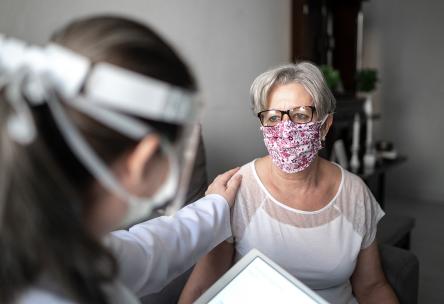Keep your body—and your mind—healthy and strong while on these effective medications

When a person has a condition like psychosis, bipolar disorder, or schizophrenia, their brain can get distorted and detached from reality. This can sometimes cause hallucinations or delusions, or severe mood and energy swings, which can be scary for all involved.
These disorders aren’t rare. The National Institute of Mental Health estimates that schizophrenia is one of the top 15 causes of disability worldwide. Bipolar disorder affects nearly four percent of American adults at some point during their lives.
Thanks to antipsychotics—which act on overactive neurotransmitters in your brain, like dopamine and serotonin—doctors can help control the symptoms associated with these disorders and, oftentimes, keep them from recurring.
As effective as antipsychotics are, like most medicines, they come with side effects. These include drowsiness, dry mouth, constipation, sexual dysfunction, and weight gain, as well as high blood sugar and cholesterol levels.
But as a recent study from Columbia University showed, the benefits of taking antipsychotics far outweigh the risks, especially if your doctor is carefully monitoring your condition.
There’s a lot you can do to help manage the side effects and lessen the risks of antipsychotics—and keep your body healthy while your mind is healing. Follow these guidelines to help you stay strong.
1. Schedule Regular Appointments with Your Doctor
When you first start taking antipsychotics, your visits to the doctor will probably be more frequent. Your care team will monitor your medications and keep track of your weight, blood pressure, blood sugar, and triglyceride levels.
Your doctor will also perform blood work every few months to measure your metabolic levels and make sure they are within a safe range. If any of your numbers are too high, your doctor may change the dosage of your antipsychotic medication, or prescribe you something to address the side effects.
Your job: Be sure to report any side effects that you may be experiencing.
2. Aim for Healthy, Frequent Meals
Eat three or four small meals a day, with lots of fruits and vegetables, limited salt, and small amounts of protein and fat. And try to avoid alcohol and sweets. However, don’t go hungry—good nutrition is important!
3. Prioritize Exercise
Being active makes you stronger, helps you maintain a healthy weight, lowers your cholesterol, and helps control your blood sugar and blood pressure. Plus, it boosts your mood and gives you a sense of accomplishment that can make you feel better about yourself.
4. Keep Taking Your Medications
If your doctor wants you to stop taking antipsychotics, you’ll get a plan for easing off of them gradually. Quitting abruptly can cause withdrawal symptoms like nausea or insomnia, or can even bring on a rebound of your psychosis. So if you’re considering stopping your antipsychotic medications for whatever reason, call your doctor as soon as possible.